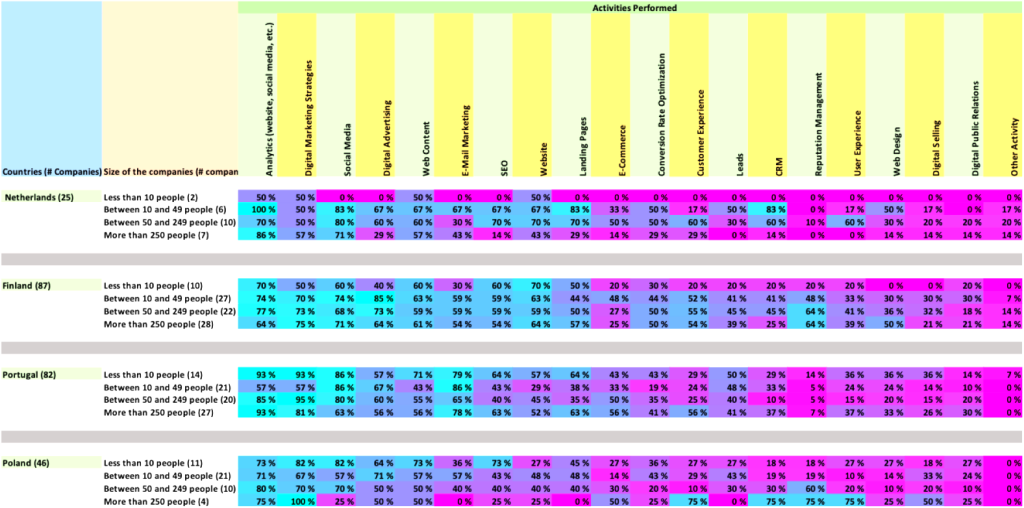
Digital Marketing – profiles and skills in different-sized Companies
Digital Marketing (DM) can be defined as the use of digital media platforms, data analytics, and technology to effectively achieve marketing goals. Digital platforms have broadened the global reach of companies and demand a surge in specialization of DM expertise. To successfully navigate DM strategies to enhance online presence, companies need to have skilled DM professionals. What is the educational background of DM professionals? Does this vary by company size? What are the differences between the four countries?
This article is based on Krishna Kanhayia’s Master’s thesis research, conducted as part of the DEMS project in 2022. The aim of the study was to find out which DM tasks are most needed in companies and what kind of education and skill profiles are required. The material was collected through a survey of 344 DM professionals in four European countries (Finland, Portugal, Poland, and the Netherlands). The article provides an insight into work tasks and educational background in relation to company size. In Finland, 86 professionals responded the survey.
Educational background for DM tasks
The study shows that in Finland, DM tasks are performed by people with a Bachelor’s degree or only a high school diploma, while the proportion of professionals with a Master’s degree seems to be lower than in other countries.
Somewhat surprisingly, 25-30% of DM professionals have only a high school education. This can be considered natural for micro enterprises, but it is rather surprising that the proportion is high (25%) even in the largest enterprises. This may indicate a ”learning-by-doing” approach to professional development.
In any case, it underlines the importance of including DM studies in the curricula of Business Bachelor programmes.

Figure 1. Educational background of DM professionals in different-sized companies.
Regarding the other countries, Netherlands shows the most similar distribution to Finland, whereas Portugal and Poland show a higher level of academic education. Especially Portuguese companies seem to trust Masters and even Doctors for DM tasks.
Work tasks in different-sized organizations
The respondents were given a list of DM-related tasks and asked to select the ones they had worked on in the last 8 days. The question aimed to find out which tasks seem to be the most needed and whether the situation differs according to the size of the company, or by country.
The most prevailing tasks seem to be those in the left columns of the table (Figure 2). Tasks related to Analytics and Digital Marketing Strategies seem to be the most frequent in Finland, followed by Social Media, Digital Advertising, SEO, Website and Web content. Remarkably, respondents in most company sizes seem to work with these tasks, with micro companies being the only exception. This partly challenges the traditional perception of multitaskers in SMEs and more specialized in large organizations, indicating that students and graduates benefit from having broad specialization rather than focusing on narrow fields.
Notably, low engagement is observed in quite many activities, including E-Commerce, Conversion Rate Optimization, Customer Experience, Leads, CRM, Reputation Management, User Experience, Web Design, Digital Selling, Digital Public Relations, and Other Activity, across all company sizes.
The lowest engagement in Finland varies by company size, with activities like Web Design, Digital Selling, Digital Public Relations, and Other Activity having the lowest participation rates, ranging from 7% to 14%.

Figure 2. Engagement in different DM tasks in different-sized companies.
Looking at the other countries, we find similarities with Finland in terms of highest engagement. The tasks in the left column seem to have high values in all countries. There are some differences in specific tasks such as Customer Experience, CRM, Reputation Management and Digital Selling. For example, Reputation Management shows high engagement in Finland, while it is low in the Netherlands and Portugal. Digital Selling shows high engagement in Poland, while the other countries have low scores. These observations may be due to different perceptions of the terms, especially in the case of the former. Also, the relatively low sample may partly affect this result.
Conclusions
Regarding the educational backgrounds of DM professionals, the results show that the distribution of academic degrees within the workforce varies significantly across countries and company sizes. These distinctions highlight the diverse educational and professional backgrounds shaping each country’s workforce, contributing to a distinct understanding of the global corporate landscape. Such as, In Finland, a more varied educational landscape emerges, with smaller companies featuring a mix of Master’s, Graduate/Bachelor, and High School degrees. Mid-sized companies show a higher prevalence of Master’s degrees, while larger companies exhibit a diverse distribution across educational levels.
As for other countries, Poland stands out with a prevalence of Master’s degrees across all company sizes, albeit with varying proportions. Smaller companies exhibit a high concentration of Master’s degrees, while mid-sized companies show a more balanced mix, and larger companies demonstrate diversity, including a notable presence of PhDs.
This multifaceted analysis provides a deeper understanding of the intersection between educational degrees, professional roles, and the broader contextual factors that shape the skillsets of DM professionals in four European countries.
In terms of task profiles, the study finds that DM activities reveal unique engagement patterns that differ by country and company size. However, the 5-6 core tasks seem to be quite similar in all four countries, even when considering company size.
As for Finland, the study shows that in all company sizes except micro, DM professionals are ”multitaskers”, i.e. their position covers tasks from social media and website content to analytics, not forgetting digital strategies. Students and graduates therefore benefit from acquiring a broader range of skills rather than specializing in a narrow focus.
Thesis in Theseus:
Kanhaiya, K. (2024). Digital marketing skills at companies in European countries. Master’s Thesis. Turku University of Applied Sciences. https://urn.fi/URN:NBN:fi:amk-2024111928715
Main photo: Pixabay
The article belongs to the publications of the Entrepreneurship and Value Creation Research Group.